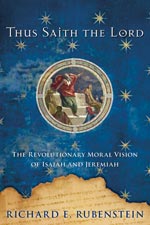 I stumbled onto the book Thus Saith the Lord by Richard Rubenstein quite by accident in a bookstore one day. I am glad I did; I am halfway through it, and so far I would say that it is one of the best biblical commentaries I have ever seen. The book focuses on the issues that concerned the major prophetic figures of the Bible, including Isaiah and Jeremiah. Drawing from a variety of biblical and extra-biblical sources, the author provides an amazingly clear and interesting depiction of the context from which these prophets emerged--namely, the geopolitics of the major powers of the Middle East, including Assyria, Babylonia, and Egypt. These prophets were intimately involved with the complicated diplomatic and military issues of the day. Comparing the imperial politics of that time with our own suggests that some things haven't changed much in over 2500 years.
I stumbled onto the book Thus Saith the Lord by Richard Rubenstein quite by accident in a bookstore one day. I am glad I did; I am halfway through it, and so far I would say that it is one of the best biblical commentaries I have ever seen. The book focuses on the issues that concerned the major prophetic figures of the Bible, including Isaiah and Jeremiah. Drawing from a variety of biblical and extra-biblical sources, the author provides an amazingly clear and interesting depiction of the context from which these prophets emerged--namely, the geopolitics of the major powers of the Middle East, including Assyria, Babylonia, and Egypt. These prophets were intimately involved with the complicated diplomatic and military issues of the day. Comparing the imperial politics of that time with our own suggests that some things haven't changed much in over 2500 years.
The rulers of Judah and Israel were bit players in the face of the overwhelming imperial juggernauts of their time--first Assyria, then Babylon. The debate over realpolitik versus a policy of justice was very much what the people of that time had to contend with. And this is an issue that we still contend with today. For example, Rubenstein writes:
Isaiah remained fascinated by Assyria, the world leader....[T]he empire-building, nation-smashing activities of the Assyrians--even their policy of mass deportations--were revelatory. They revealed, first of all, that just as God is One, the earth's inhabitants are one. The correlative of monotheism is the unity of mankind. And second, the Assyrians' behavior demonstrated the inefficacy of coercive power to create that unity. They could create the conditions for international community, for example, by building magnificent roads to facilitate travel between distant parts of the empire. But roads used for conquest and rebellion could not provide a stable basis for peaceful intercourse among people. Only when the power of all nations is subordinated to YHVH's universal ethics will the highways become a blessing.This is a lesson that still holds true today. The modern American Empire has attempted to use its coercive power in Iraq, but, as in the days of ancient Assyria, it was unable to "provide a stable basis for peaceful intercourse among people." And just as ancient Assyria's infrastructural innovations and technology were not enough to assure a lasting justice and peace, the modern American use of technology--from the internet to its array of weaponry--is also woefully inadequate in and of itself. Isaiah wanted no part of the "practical" politics that governed the foreign and domestic politics of his day. He understood that supposedly practical considerations that did not seek to establish a just social order were doomed to failure. As Rubenstein points out,
To Isaiah, the idea of a peaceful resolution of international conflicts was not at all posthistorical or utopian. The political history of his own time demonstrated the hopelessness of trying to establish a stable world order on the basis either of imperial might or violent rebellion. What would finally organize international politics, he was certain, would not be some sort of pax Assyriana but "a peace that has no end." The Assyrian "king of the world" could not realize such a peace, but those following the world's true king could do so--and not at the end of history, but in the course of it.Some Christians have, unfortunately, been focused on the idea of waiting for God to intervene in order to bring about a utopian vision after the end of history. Believers in a "rapture" are an example of such Christians, and the "Left Behind" series of books and video games have all played to such a vision. This hope for Divine intervention is not new. Dominic Crossan believes that John the Baptist subscribed to a similar notion of a future intervention by God to bring about a better world--although he also believed that Jesus, his disciple, rejected that vision in favor of bringing about an imminent Kingdom of God through human activity.
According to Rubenstein, Isaiah believed that the building of a just and peaceful world could happen within the course of history. I suppose I could be described as a radical utopian for believing that it is possible for the human race to achieve the kind of just society that Isaiah believed in. My vision is radical indeed--a world based on the priority of human needs rather than corporate profits, of peace rather than war. I am not naive enough to believe that such a society will happen any time soon. But I do believe that we have no choice but to try to work towards its accomplishment, even if the best we can do is make our small contributions and hope that in some way our efforts will make a difference in the long run. Perhaps, at some distant time in the future, that which we seek will come to fruition.
0 comments:
Post a Comment